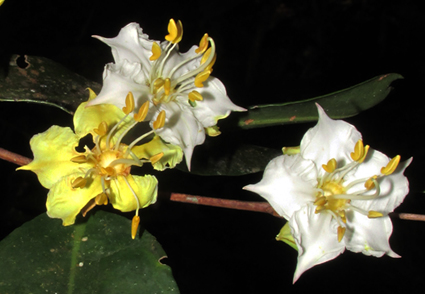Abstract
Based on new samples from the Atlantic Forest between northern São Paulo and southern Bahia, Brazil, we clarify taxonomic relationships in two little-known species of Mouriri. As a result, we synonymize M. megasperma and M. sellowiana under M. arborea, and M. bahiensis under M. regeliana. We designate a lectotype for M. sellowiana, as the holotype was destroyed during World War II. In addition, we present updated morphological descriptions, data on geographic distribution, conservation status assignments, illustrations, and comments on taxonomic and nomenclatural aspects of M. arborea and M. regeliana. Photographs based on fresh material of M. arborea are presented.
References
- Aublet, F. (1775) Histoire des plantes de la Guiane françoise. Tome premier. Pierre-François Didot jeune, London & Paris.
- Berg, O.K. (1856) Aulacocarpus O. Berg. Linnaea 27 (2–3): 137, 345–346. https://doi.org/10.1093/nq/s2-I.18.345
- Berg, O.K. (1857) Aulacocarpus sellowianus O.Berg. In: Martius, C.F.P., Eichler, A.W. & Urban, I. (Eds.) Flora Brasiliensis 14 (1). pp. 381, t. 40.
- Burret, M. (1931) Aulacocarpus Berg = Mouriria Aubl. Notizblatt des Königl. botanischen Gartens und Museums zu Berlin 11 (102): 150–151. https://doi.org/10.2307/3994597
- Centro Nacional de Conservação da Flora (CNCFlora) (2012) Mouriri megasperma. In: Lista Vermelha da flora brasileira versão 2012.2. Centro Nacional de Conservação da Flora. Available from: http://cncflora.jbrj.gov.br/portal/pt-br/profile/Mouriri%20megasperma (accessed 6 March 2024)
- Centro de Referência e Informação Ambiental (CRIA) (2023) speciesLink network. Available from: https://specieslink.net/ (accessed 19 November 2023)
- Cogniaux, A.C. (1888) Mouriri regeliana Cogn. In: Martius, C.F.P., Eichler, A.W. & Urban, I. (Eds.) Flora Brasiliensis 14 (4). pp. 572, t. 122, f. 2.
- Fernandez, E. & Moraes, M. (2019) Mouriri regeliana (Melastomataceae). Lista Vermelha da Flora Brasileira. Centro Nacional de Conservação da Flora/ Instituto de Pesquisas Jardim Botânico do Rio de Janeiro. Available from: https://proflora.jbrj.gov.br/html/Mouriri%20regeliana_2019.html (accessed 7 March 2024)
- Fernandez, E. & Amorim, E. (2020) Mouriri bahiensis (Melastomataceae). Lista Vermelha da Flora Brasileira. Centro Nacional de Conservação da Flora/ Instituto de Pesquisas Jardim Botânico do Rio de Janeiro. Available from: https://proflora.jbrj.gov.br/html/Mouriri%20bahiensis_2020.html (accessed 7 March 2024)
- Gardner, G. (1843) Mouriri arborea Gardner. In: Hooker, W.J. Icones plantarum or figures, with brief descriptive characters and remarks, of new or rare plants, selected from the author’s herbarium. London: London, Longman, Rees, Orme, Brown, Green, & Longman, etc, t. 515.
- Goldenberg, R. (2009) Mouriri Aubl. In: Martins, S.E., Wanderley, M.G.L., Sheperd, G.J., Giulietti, A.M. & Melhem, T.S. (eds.) Flora Fanerogâmica do Estado de São Paulo. Vol. 6. FAPESP, São Paulo, pp. 108–110.
- Goldenberg, R., Meirelles, J. & Amano, E. (2013) Mouriri morleyii sp. nov. (Melastomataceae) from Brazil, with notes on its foliar stomatal crypts. Nordic Journal of Botany 31: 321–325. https://doi.org/10.1111/j.1756-1051.2012.01668.x
- Hickey, L.J. (1973) Classification of the architecture of dicotyledonous leaves. American Journal of Botany 60 (1): 17–33. https://doi.org/10.1002/j.1537-2197.1973.tb10192.x
- International Union for Conservation of Nature (IUCN) (2012) IUCN Red List Categories and Criteria. Version 3.1. 2 edition. Gland, Switzerland and Cambridge, UK, 32 pp.
- Junikka, L. (1994) Survey of english macroscopic bark terminology. International Association of Wood Anatomists Journal 15 (1): 3–45. https://doi.org/10.1163/22941932-90001338
- Laurance, W.F. (2009) Conserving the hottest of the hotspots. Biological Conservation 142: 1137–1137.
- Moraes, P.L.R. de (2009) The Brazilian herbarium of Maximilian, Prince of Wied. Neodiversity 4: 16–51. https://doi.org/10.13102/neod.42.1
- Moraes, P.L.R. de (2012) The Lauraceae Collected in Brazil by Ludwig Riedel—I. Harvard Papers in Botany 17 (1): 185–216. https://doi.org/10.3100/025.017.0121
- Morley, T. (1976) Memecyleae (Melastomataceae). Flora Neotropica monograph 13: 1–295.
- Morley, T. (1985) Five new taxa of New World Memecyleae (Melastomataceae). Annals of the Missouri Botanical Garden 72 (3): 548–557. https://doi.org/10.2307/2399105
- Morley, T. (1989) New species and other taxonomic matters in the New World Memecyleae (Melastomataceae). Annals of the Missouri Botanical Garden 76: 430–443. https://doi.org/10.2307/2399492
- Morley, T. (1993a) Four new taxa and one rediscovered species of Mouriri (Melastomataceae). Novon 3: 164–175. https://doi.org/10.2307/3391529
- Morley, T. (1993b) A new Mouriri (Melastomataceae) from the Dominican Republic. Novon 3: 274–277. https://doi.org/10.2307/3391470
- Morley, T. (1998) A new and an emended species of Mouriri (Melastomataceae). Novon 8: 41–44. https://doi.org/10.2307/3391890
- Morley, T. & Thomsen, K. (1997) A new Mouriri (Melastomataceae) from the Osa Peninsula of Costa Rica. BioLlania (Edición Especial) 6: 467–471.
- Murray-Smith, C., Brummitt, N.A., Oliveira-Filho, A.T., Bachman, S., Moat, J., Lughadha, E.M.N. & Lucas, E.J. (2009) Plant diversity hotspots in the Atlantic coastal forests of Brazil. Conservation Biology 23 (1): 151–163. https://doi.org/10.1111/j.1523-1739.2008.01075.x
- Radford, A.E., Dickison, W.C., Massey, J.R. & Bell, C.R. (1986) Vascular Plant Systematics. New York: Harper and Row Publishers, 891 pp.
- Reflora Virtual Herbarium (2022) Available from: https://floradobrasil.jbrj.gov.br/reflora/herbarioVirtual (accessed 19 November 2023).
- Saldanha da Gama, J. & Cogniaux, A. (1887) Bouquet de Mélastomacées brésiliennes: dédiées a Sa Majesté Dom Pedro II empereur du Brésil. Verviers [Belgium], Impr. A. Remacle. https://doi.org/10.5962/bhl.title.884
- SOS Mata Atlântica & Instituto Nacional de Pesquisas Espaciais (INPE) (2024) Aqui tem Mata? Available from: https://www.aquitemmata.org.br/# (accessed 8 March 2024)
- Thiers, B.M. (2024 [updated continuously]) Index Herbariorum. Available from: https://sweetgum.nybg.org/science/ih/ (accessed 12 March 2024).
- Thomas, W.W., Carvalho, A.M.V., Amorim, A.M., Garrison, J. & Arbelaéz, A.L. (1998) Plant endemism in two forests in southern Bahia, Brazil. Biodiversity & Conservation 7: 311–322. https://doi.org/10.1023/A:1008825627656
- Turland, N.J., Wiersema, J.H., Barrie, F.R., Greuter, W., Hawksworth, D.L., Herendeen, P.S., Knapp, S., Kusber, W.-H., Li, D.-Z., Marhold, K., May, T.W., McNeill, J., Monro, A.M., Prado, J., Price, M.J. & Smith, G.F. (eds.) (2018) International Code of Nomenclature for algae, fungi, and plants (Shenzhen Code) adopted by the Nineteenth International Botanical Congress Shenzhen, China, July 2017. Regnum Vegetabile 159. Glashütten: Koeltz Botanical Books. https://doi.org/10.12705/Code.2018
- Urban, I. (1906) Vitae itineraque collectorum botanicorum, Notae collaboratorum biographicae, Flora Brasiliensis ratio edendi chronologica, Systema, Index Familiarum. In: Martius, C.F.P., Eichler, A.G. & Urban, I. (Eds.) Flora Brasiliensis 1 (1). pp. 1–268.
- Völtz, R.R. & Goldenberg, R. (2024) Mouriri. In: Flora e Funga do Brasil. Jardim Botânico do Rio de Janeiro. Available from: http://foradobrasil.jbrj.gov.br/refora/foradobrasil/FB9814 (accessed 17 January 2024)


